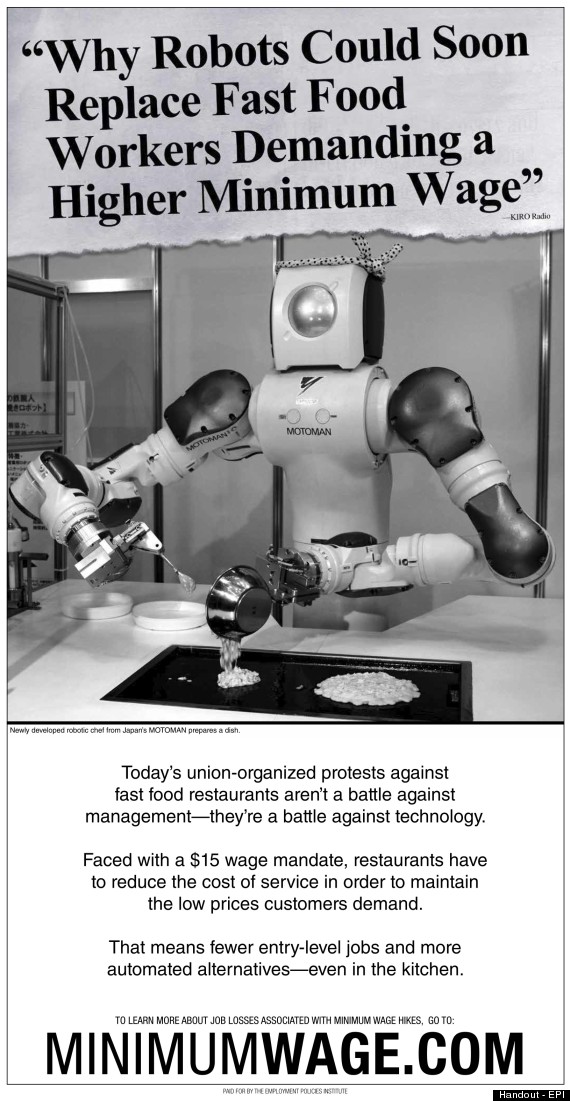NEW YORK -- The poster boy for the movement that opposes a major increase in the minimum wage is a burger-flipping fraud.
A Japanese "robotic chef" that was held up Thursday as a hassle-free alternative for restaurant owners sick of dealing with human line cooks would simply not be able to do the job, the machine's manufacturer told The Huffington Post.
The Motoman SDA10 robot gained brief notoriety Thursday when it appeared on a full-page ad in The Wall Street Journal that stated "robots could soon replace fast food workers demanding a minimum higher wage." (The ad is reproduced below.)

Friday, the Japanese electronics giant that manufactures the robot told HuffPost that the machine was designed for industrial applications and would not be able to replace a cook in a restaurant.
"The robot does not have a real capability for that," Sam Komiyaji, a marketing manager at Yaskawa Motoman, said in a phone interview from Tokyo.
Komiyaji explained the picture was taken at a 2009 exhibit that was a marketing stunt intended to show the industrial robot has a greater degree of flexibility and dexterity than competitor's offerings. Similar stunts have seen the same robot deal cards and serve ice cream. During the exhibit, the robot was placed in a carefully constructed kitchen and was able to dump a bowl of pre-mixed batter on a hot griddle, flip a savory okonomiya pancake with a spatula, and serve the meal.
The impressive-looking display only worked, however, because the kitchen was meticulously arranged to accommodate the robot. The machine is designed for repetitive tasks that rarely require discretion, such as packing items into boxes or assembling electronics, and not for more unpredictable tasks, like those involved in cooking.
"When we placed this robot in a kitchen, that's just in an exhibition kitchen," Komiyaji said. "We are suggesting this robot for assembling or handling tasks that are very boring. We are looking at it for packing or warehouse work."
The Yaskawa robot would conceivably have a lot of difficulty as a line cook. Komiyaji said it took engineers two weeks to teach the machine how to go through the motions for the pancake exhibit, and even then it could only do four variations on a dish. A design document from Yaskawa states the robot has only limited ability to deviate from pre-set instructions, which could be a problem if consumers want extra ketchup or no onions on their burgers. The document also states the machine cannot lift more than 45 pounds. A crucial component of the device can't operate if ambient humidity exceeds 90 percent, an impossible standard for a commercial kitchen. The robot also costs $10,000, is bolted to the floor and requires monitoring by an operator to avoid overheating, Komiyaji said.
In spite of those facts, the research director with the group that used the Motoman in its ad said Friday said he stands by it.
"I completely disagree that the ad is in any way misleading," said Michael Saltsman, a research director at the Employment Policies Institute. "We're talking about what's already possible."
Saltsman claimed to HuffPost that the robot was "designed" to cook, despite the manufacturers assertion to the contrary.
Saltsman also pointed to another company, Momentum Machines, that he said "has created an automated burger creator that can make 400 burgers an hour without walkouts and without demands for higher pay."
Momentum, a San Francisco start-up, has designed a conveyor belt-style gadget that assembles ground meat patties, vegetables and buns loaded into specific compartments. The company has developed a prototype and solicited investment.
Repeated requests for comment left with Momentum and company co-founder Steve Frehn Friday morning were not returned.
Saltsman also suggested that retail and food establishments have recently pushed to lower labor costs through the use of machines, be it self-serve soda dispensers at fast-food restaurants or self-checkout touchscreens at convenience stores.
"The technology is out there," Saltsman said.

